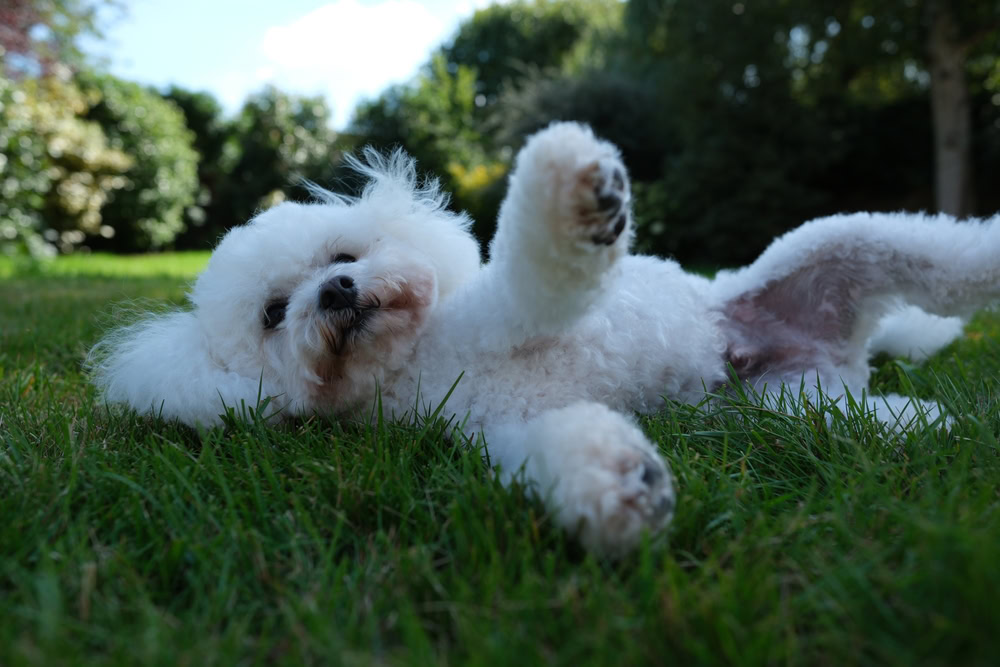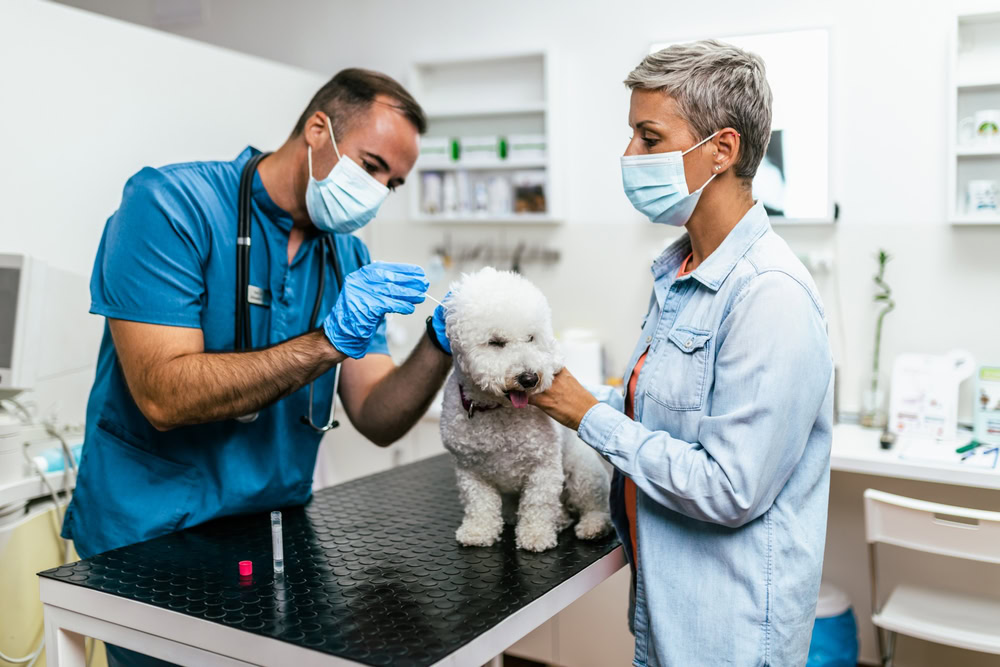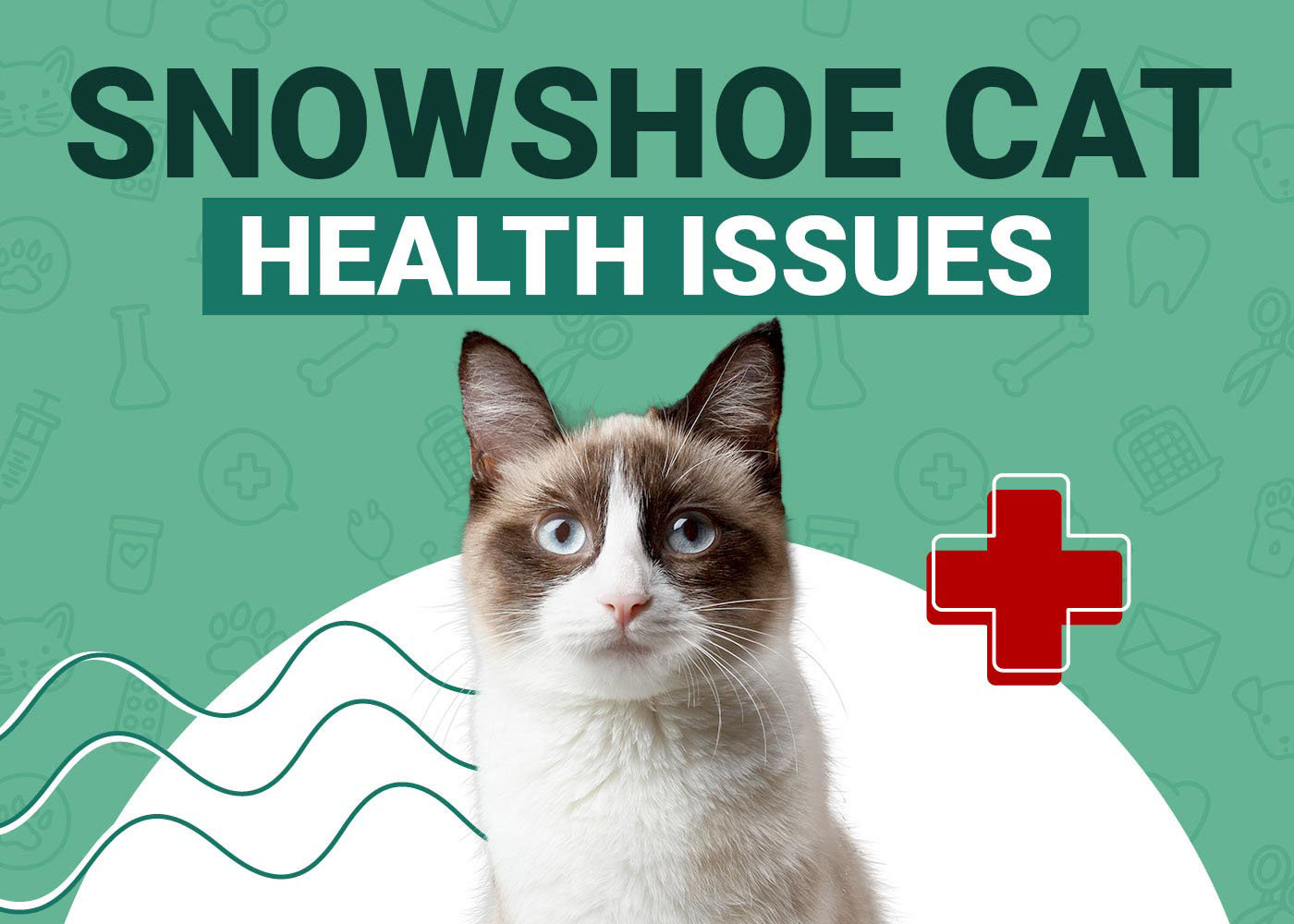VET APPROVED

The information is current and up-to-date in accordance with the latest veterinarian research.
Learn more »Most people know the Bichon Frise for being a gentle, typically well-mannered, small white dog. The Bichon is known for their hearty nature and longevity. However, this doesn’t mean that the Bichon is without health issues. In this article we will discuss 6 common health issues of the Bichon Frise that you should know about. We will discuss their eye issues, allergies, common orthopedic problems, dental disease, weight issues, and metabolic disease such as Cushing’s and diabetes. Overall, educating yourself on the Bichon will help you be more prepared to be the best Bichon Frise parent you can be.

The 6 Bichon Frise Health Issues
1. Allergies
Allergies are a common occurrence in many dogs and seem to be getting more common. While the media may make you think that every dog is allergic to grains, in reality food allergies are not the most common thing we see in dogs. In dogs such as the Bichon Frise, allergies to things in the environment (pollens, molds, house dust mites etc.) and allergies to fleas are much more common.
These allergies will manifest as itching skin. You may notice your Bichon constantly licking, chewing, and biting at themselves, especially their feet, lower legs, tail base area, and belly. This is because these areas of their body are pruritic, or itchy. Your Bichon will then start to bite these areas, oftentimes making the skin irritated, swollen, and infected. The infection and inflammation will cause a snowball effect and your Bichon will then want to bother these areas even more.
Allergies can be difficult to diagnose, and sometimes even more difficult to control. There are some great options available nowadays to help control itching in your Bichon, but they are prescription only and have to be purchased at a veterinarian’s office. Any itchy dog is typically put on regular prescription flea prevention as well, and oftentimes special diets are used in case there are some food sensitivities. If you notice your Bichon is developing itchy and/or red feet, skin, or has frequent ear infections, speak with your veterinarian about possible allergies.
2. Dental Disease
Brushing your dog’s teeth should be part of your regular routine. There are also some great dental chews available too that may help keep your Bichon’s teeth healthy. Even with these things, smaller breed dogs such as the Bichon often develop dental tartar much easier and at a much younger age than larger breed dogs.
You will want to monitor your Bichon for any redness to the gums, especially along the gumline near the teeth. Their breath may also start to have an odor to it, and/or you may notice tartar buildup. Regular exams with your veterinarian will help determine if your Bichon has dental disease and what stage (how severe) it is. Regular cleanings are a great idea to keep the tartar and gums healthy.
If left untreated – i.e., no brushing, dental chews, and/or regular dental cleanings – your Bichon may start to lose teeth, develop abscesses, and eventually experience pain and discomfort while eating/chewing. We never recommend giving your dog hard bones, rawhides, rope toys, or other chews to use unless approved by your veterinarian. A lot of chews and chew toys out there that are marketed for “dental health” may actually cause your Bichon to break their teeth or the chew can become stuck in their throat.
3. Obesity
Bichons are considered small breed dogs. As with other smaller breeds, the Bichon will have a much lower caloric requirement than medium and large dogs. Being smaller can make it difficult to know exactly how much to feed your Bichon. Without even knowing, you may be grossly overfeeding your dog. In addition, if your best friend sits next to you with those “puppy dog eyes” and begs for human food, even a small snack can add significant calories, fat, and carbs.
As a veterinarian, we not only recommend how much to feed a dog based on their weight, but also their daily needs. Daily needs are different depending on any underlying health issues, the activity level of the dog, and age. Work with your veterinarian to determine how many calories you should be feeding your Bichon every day. There is no typical weight range for a Bichon as we look at overall body weight and body condition score (BCS) for each pet. Your veterinarian can help you determine an ideal BCS and correlating weight for your Bichon.
Making sure your Bichon is at a healthy weight adds to their longevity. They will have fewer joint issues, less stress on their airways, and often, less sensitive tummy issues when on a regular diet. As veterinarians we understand that you want to share your food and love giving your Bichon extra attention and love. But making sure you’re measuring their food and sticking to a prescribed diet plan will help your Bichon be with you as long as possible.
4. Eye Problems
Eye problems in the Bichon are not a one-size-fits-all. Depending on if your Bichon also has any metabolic issues and/or allergies, they may be more prone to developing cataracts, glaucoma, irritation, and conjunctivitis. While some eye problems are more common in older dogs, others can be seen at any age.
Your Bichon should be free of any redness to the whites of their eyes, no crusted discharge, no squinting, and overall, not seem to have pain and/or irritation to either of their eyes. Eye problems are known for progressing and becoming worse very quickly. It’s important that you get any eye issues examined by a veterinarian. Sometimes a Board Certified Ophthalmologist is needed for certain diagnostics and treatment, but your veterinarian should be able to complete a baseline exam.

5. Luxating Patella(s)
A luxating patella is a kneecap that moves out of its normal position. Each back leg in a dog has a patella that normally sits in the middle of the knee. The patella helps with bending and straightening the knee joint, and also aids in protection of the knee joint. Each patella sits in a little groove (called the patellar groove). Oftentimes in the Bichon, the kneecap will move to either the inside or the outside of the knee. This is typically because the patellar groove is too shallow, and it will move easily. This is commonly congenital. Patellas can also luxate from trauma to the knee, which is not a congenital problem.
A luxating patella can be very painful if it’s from trauma. Patellas that move chronically will develop arthritis over time, which can also be painful and make moving the knee(s) difficult. A luxating patella is very easy to diagnose. Pain medications prescribed by your veterinarian are typically recommended, though sometimes surgery is needed.
6. Metabolic Diseases
The term “metabolic diseases” is a blanket term for many things. In the small breed Bichon, common metabolic diseases would include diabetes mellitus, hyperadrenocorticism (i.e., Cushing’s disease), hypoadrenocorticism (Addison’s disease), and hypothyroidism.
Each of these diseases have different abnormalities associated with them, and different tests to diagnose them. What all of them have in common is the need for baseline bloodwork and urine testing. This can often be done in-house at your veterinarian, though may cost less if they send it to a laboratory. Depending on those results, your veterinarian may then recommend further testing to figure out what your Bichon may or may not have.
Not surprisingly, each one of these metabolic diseases is also treated differently. What your Bichon needs, how often they need follow-up testing, and costs may vary greatly depending on what is going on. Always follow up with your veterinarian so that your Bichon can be as healthy as possible.


Conclusion
Overall, the Bichon Frise is a great small breed companion dog. They typically live long, healthy lives, though are not without their health problems. Bichon Frises can still commonly suffer from allergies, eye problems, metabolic diseases and luxating patellas. Similar to other small breed dogs, the Bichon Frise is also prone to becoming obese and developing dental disease. Following your veterinarian’s advice on daily and long term care of your dog, in addition to completing recommended routine testing, will help keep your Bichon Frise healthy for many years.
Featured Image Credit: hedgehog94, Shutterstock












